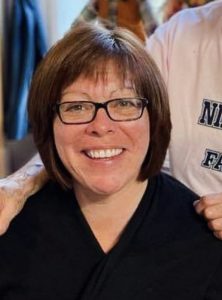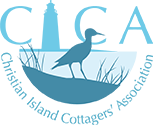Get to know Jane Copegog of BFN – September 2025
Jane Copegog, the Lands Manager for Beausoleil First Nation, spoke with Stephanie Reed about some of her experiences as a resident of Chiminissing, her hobbies, and her family.
 S: Tell me a little bit about yourself and your family’s history on the island?
S: Tell me a little bit about yourself and your family’s history on the island?
J: I actually lived in the city for most of my life, but I did have a deep connection to the island. My mother is a member here, and most of our summers and holidays were here on the island.
When I was born, my mother came to the island for seven months so her parents could help her. I can’t even imagine what it would be like to have twins. I think knowing that my first seven months of life were spent here, could be why I feel so rooted to the island. We kind of started here.
S: What was it like being a twin growing up?
J: Looking back, I’ve never really thought it was anything special. But now I realize that my sister and I were inseparable. When we were in elementary school, they eventually separated us into different classrooms. We would answer for each other and talk for the other. So at some point, we got split up so that we could have a little independence and I think it did help, but we always remained close.
We are still so similar. We like all the same things – we eat the same things, dress the same, talk the same. A lot of people cannot tell us a part over the phone, but it’s easier to tell by our looks because we don’t look so similar anymore.
S: Are you fraternal or identical twins?
J: Identical. But now that we are older, my sister Pam has short curly hair, and mine is straight. We joke around because I have a brother, 11 months younger than us, so for about 1 month we are all the same age, almost like triplets for a month of the year.
Image: Jane, Brandon, and Pamela
S: Is there a message your parents passed down to you that sticks out?
J: I would say they encouraged us to always remain close with each other, which we have. I think that what we get most though from our parents, is their sense of humor. My dad especially was a very comical, humourous man. And my mother as well, she is a very silly person. Our family likes to laugh.
S: Did you have any nicknames growing up?
J: I always joke about this. I didn’t have a nickname, but I would answer to Pam, my sister’s name, as well.
S: What did you want to be when you grew up?
J: I used to devour true crime novels. When I was around 14 years old, I loved reading and really got into that genre. So I’d say I wanted to be an FBI agent when I was younger. But my life didn’t follow that route, and here I am working for the Lands Management. To this day, I still love true crime. I can never get enough of it. I watch all the shows. It may be because I am nosey as well. When I was younger my sister called me Barbara Walters because I was so curious and had to know everything about a person. I would pepper people with questions.
S: Do you have a favourite memory of being on the water or a memory that sticks out from your time on the island?
J: I think what I remember most is just how care free we were growing up. And that’s what I remember loving about the island. As soon as we got off the boat, we lost our shoes and ran around all summer, no shoes, feet in the sand, swimming and having a carefree time with the family.
I remember trying to describe our time spent on Christian Island to friends back home. Visiting my grandparents on the island, they had running water in the kitchen but their house didn’t have a functioning bathroom for some time. So trying to describe this to our friends, sounded like describing pioneer times where we had to use the outhouse and having a bath in a metal wash tub.
It was a much different experience back in those days being on the island and then going back to the city
S: It must’ve felt like two different worlds.
J: Yes, but I always preferred this world here on the island, so I always came back.
S: Now that the new ferry has arrived, what has this moment meant to you to finally see it there?
J: Well, it has been a long time coming. I think like everyone else, I just kept saying, “I’ll believe it when I see it”.
I was elected onto council in the previous term and that was part of our focus to try and get things moving. Frustrating at times. But now that it’s here it’s going to make a world of difference. The Sandy Graham wasn’t always reliable and has its problems. This new boat means safety for us and in a way it means a little bit more freedom.
S: I was watching the live stream of it arriving and it was so exciting. I even found it emotional.
J: Oh yes. I was standing at the dock, thinking I wasn’t too excited about it because we just waited so long and had a negative emotion attached to it because of the delays. But I don’t know why, as soon as that boat pulled in, I almost wanted to cry.
S: There must have been so much anticipation and pure excitement for the community.
J: Yes, and relief, that it was finally here and had a safe journey so that this dream could finally come true for us.
S: Do you have a favourite place or spot on the island? Perhaps to watch a sunset.
J: I think every area on Christian Island is a nice spot to sit but my favourite is my front porch. I’m fortunate enough to live on top of a hill so I can see towards the dock and watch the boats. It was the reason I wanted my house there, for the view of the boats. I sit out there quite often.
S: Do you have a story about that island that might surprise people?
J: Well I have been here since ‘93. I went to school in Sudbury, Cambrian College. I have a diploma in Native Lands Management. Since then, I’ve been with the Lands Department on and off. And I’ve seen a lot of progress and projects come to fruition.
I think back to the early days when I first started, and it was just two staff here. Now we have eight staff with one more coming in. We started with delegation of Land Management Authority, which was the beginning of sectoral self government, where we assumed section 53 and 60 of the Indian Act. That was the process. We had to receive consent from the community, and vote on it.
In 2019, the membership approved our land code which allowed the First Nation to opt out of the Indian Act’s land-related sections to govern our own reserve lands and natural resources. It’s a big deal. It was quite the process to take the steps to become self-governing.
S: Do you have any family traditions, old or new?
J: It’s not a tradition, but my grandfather, Alec Copegog, he was a farmer and a logger for most of his life. I think of him as living the life of a pioneer. He had a team of horses and an old fashioned plow he would plow up the fields. I used to be amazed that he would cut all these trees and haul them with just a team of horses.
Today, some members of our family garden, not full scale farming like my grandfather, but I like to think that we are connected to the land similar to the way he was through our passion for the land.
Image: Alec Copegog, farmer and logger.
And now that I think about it, my favourite memory was with my grandfather, he would load us up and take us in the wagon and go for a ride with his horses in the bush.
My dad, who just recently passed, he’s not a member. He grew up in Northern Ontario. We all lived in the city until my sister and I moved back to the island after college. Eventually, my parents moved to the island when my sister had her son. My dad had never been to the island until then. But he loved it here. It reminded him of Northern Ontario.
I’m glad he chose to move here 30 years ago. And to see why we loved this place so much. And him coming to love the island just as much, maybe even more.
S: Do you have any keepsakes that you’ve held onto over the years?
J: My grandfather also made axe handles for the community. I’m sure someone might still have one and that would have been nice to have.
I make moccasins and gloves, and have sold them in the community. I don’t do it often but I make gifts for family and friends. But it would be nice for those creations to live on.
Image: One of Jane’s creations.
S: Do you have an achievement that you are most proud of?
J: My greatest achievement in life has been my son. His name is Lance, he is 24. He’s my pride and joy. And he took an interest in politics at a young age and is now quite well known in his circle. I’m very proud of him and I’m glad that he’s doing what he loves. Any time I see his name in print or on a website, there is an immense sense of pride. I’m like, “I made that child!”.
S: What are some of the biggest changes you’ve seen on the island?
J: So many things. We have paved roads now, I never thought I’d see that in my lifetime. We have found that a lot of people in our community are developing cancer. And I wondered if there is any connection to inhaling the dust from dirt roads.
We have new beautiful buildings, a skating rink, and a women’s shelter coming soon. They are going to be offering mental health programs there too. We also have a para-medicine program on the island. They are amazing. They are the reason we were able to keep my dad at home for so long. They were only a call away and provided such great support for my mother. Truly such a great group of people. They are developing the program even more, and offering services that you would normally have to go off the island for, like taking blood and even administering drugs.
S: Do you have any words of advice for the younger generation?
J: I guess for the kids here on the island, to go out and make experiences and don’t be afraid to leave the island. There’s a big world out there, and lots to learn. I always say once you go out and gain knowledge and experiences, come home and share them with everybody.
S: Thank you so much Jane for speaking with me today! I loved hearing your insights and reflections.



